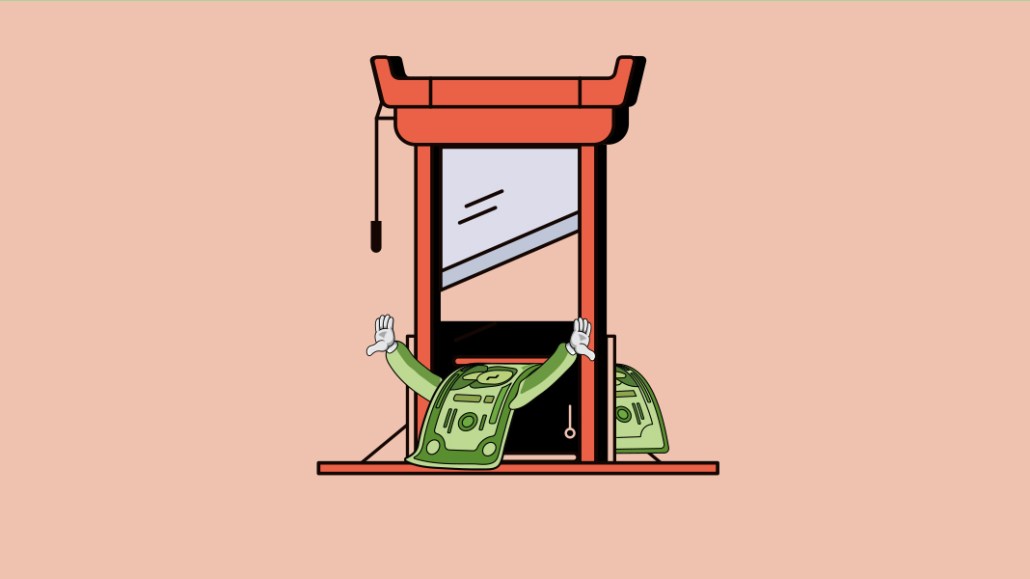Secure your place at the Digiday Media Buying Summit in Nashville, March 2-4
DTC brands are tightening up how much they spend on digital advertising

For the past couple of years, investors have been urging direct-to-consumer brands to rely less on digital advertising to acquire new customers. Now, it’s become even more important for them to be more efficient with their advertising spend with the coronavirus pandemic.
First: some cuts. Many direct-to-consumer advertising brands are pulling back on their advertising spend on Facebook and Google as they anticipate shoppers will tighten their wallets in the coming months. Joe Yakuel, founder and CEO of performance marketing agency Within, which has worked with Nike and Spanx among other brands, estimated that among his clients overall, their ad spend was down a little more than a third at the beginning of last week, compared to two weeks ago. Within also launched a COVID-19 ad spend tracker, which shows that among a sampling of the agency’s fashion and luxury clients, Facebook ad spend was down roughly 27% and 36% month-over-month respectively.
At the same time, DTC executives and marketing agencies report that cost-per-clicks and CPMs on Facebook are dropping right now for many companies. “The advertisers who are selling non-essential goods, they have to figure out how to make that click worth more in the moment,” said Andrew Faris, CEO of e-commerce holding company 4X400.
In the quest of exponential growth high enough to satisfy venture capitalists’ demands, brands in the early days of the direct-to-consumer boom relied heavily on paid advertising channels like Facebook and Instagram for nearly all of their new customer acquisition efforts. But as more brands started advertising on there, the costs to acquire customers through these channels also rose. Now, in recent months, startups have relied more on other forms of marketing like partnerships and events, as well as more organic social media. The coronavirus outbreak could accelerate brands’ shift towards more low-cost customer acquisition efforts, as brands will be forced to operate on an even tighter budget, and can’t afford to spend any marketing money that won’t yield them valuable customers. It may also lead to some brands advertising more on Facebook, in order to take advantage of it becoming a less popular advertising channel.
As consumer confidence gets lower, many shoppers will be looking to tighten up their wallets, and limit their spending only to the essentials. As such, brands will have to figure out how to market their products to customers as an essential or a good deal.
4X400, which owns three different brands, is a good example of just how widely brands’ advertising experiences have varied in recent days. Its brand that has been hit the hardest is Fielders Choice Goods, which sells leather wallets. Faris said that while Fielders Choice Goods’ cost-per-click is down about 30%, its conversion rates are also down. 4X400 advertises primarily through Facebook and Instagram, and also spends on Google Search, Faris said.
While typically, 30% of customers who get to the checkout page for Fielders Choice Goods ultimately buy the product, now that’s down to about 15%. As a result, Faris said Fielders Choice Goods is considering offering a steeper discount — 20% — to customers who reach the checkout page but don’t ultimately buy. Typically the brand will offer customers who have an abandoned cart that’s older than a week a 10% discount.
Another one of its brands, Bambu Earth, sells skincare products, has not seen its conversion rates drop in recent weeks, and among returning customers, conversion rates have risen about 10% to 15%.
As a result, 4X400 is pulling back more advertising spend on Fielders Choice Goods more drastically than it is for Bambu Earth. Overall though, 4X400 is pulling back its ad spend about 25% to 50% across all three brands, though it varies depending on the day, Faris estimates. Faris said that 4X400 is pulling back on ad spend mostly to ensure it has enough cash on hand.
“We’re not a huge business, so we’re going to be playing it pretty thin cash wise to get to Father’s Day,” Faris said. 4X400 has raised $1 million total in venture capital funding.
Not everyone has pulled back. Mike Grillo, CEO of weighted blanket company Gravity Products, said that the company hadn’t pulled back advertising spend because “we see this as an important time to provide value to our customers.” He did say, however, that the company would be revamping its organic marketing strategy to run more content on its social channels and through its email newsletter that focus on tips for staying healthy and managing anxiety for people who are self-isolating.
Yakuel predicts that, as brands tighten up their digital advertising budgets, Google Search and dynamic retargeting ads on social will remain relatively safe. Rather he predicts that prospecting ads, or ads that attempt to reach new customers that have never interacted with the brand before, will be the first to get cut.
“There’s no search intent behind it, there’s no purchase intent behind it,” Yakuel said.
More in Marketing

Future of Marketing Briefing: AI’s branding problem is why marketers keep it off the label
The reputational downside is clearer than the branding upside, which makes discretion the safer strategy.

While holdcos build ‘death stars of content,’ indie creative agencies take alternative routes
Indie agencies and the holding company sector were once bound together. The Super Bowl and WPP’s latest remodeling plans show they’re heading in different directions.

How Boll & Branch leverages AI for operational and creative tasks
Boll & Branch first and foremost uses AI to manage workflows across teams.





